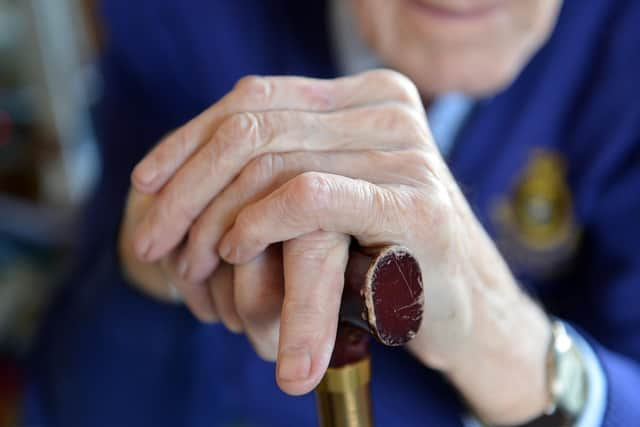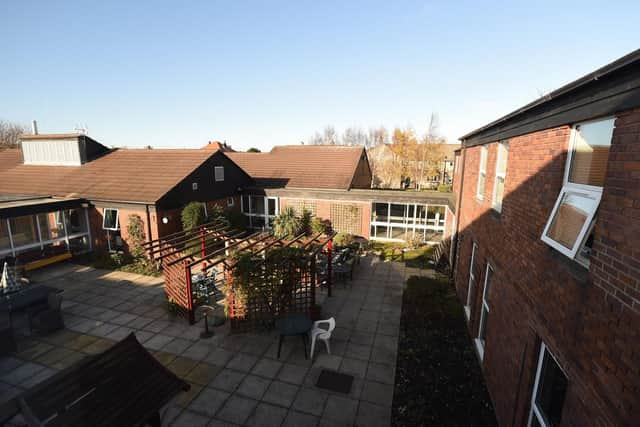Chronic shortage of care workers in Lancaster sees patients stuck in hospital for weeks on end
and live on Freeview channel 276
Recently, 113 patients across hospitals in Lancaster, Kendal and Barrow who no longer required an acute hospital bed couldn’t leave because of difficulties organising care packages in the community or care homes.
During the summer and autumn, this number fluctuated between 120-160: up to 30% of the University Hospitals of Morecambe Bay NHS Foundation Trust’s bed base.
Advertisement
Hide AdAdvertisement
Hide AdThe Trust’s chief operating officer, Scott McLean, said: "Across the Integrated Care Board (ICB, the new body that plans health and care services), there is reduced domiciliary capacity which has an impact on the ability to discharge patients who have an ongoing need for care provision in their own home.


“There are also challenges accessing care home placements, particularly for specialised care, with a number of patients waiting for these beds.”
In 2020, 50 care homes in Lancaster and Morecambe were registered with the Care Quality Commission (CQC) but by November 2022, this number fell to 44, including the Scaleford Care Home in Lancaster which a CQC report had said ‘required improvement’ in April.
Partners, including health, care and voluntary services, were working collaboratively to support timely hospital discharges, particularly over the winter, Mr McLean added.
Advertisement
Hide AdAdvertisement
Hide Ad"The development of virtual wards is also ongoing. This will support patients to remain at home, or if they did present to the Emergency Department they can be rapidly moved home with a higher level support until that acute episode has resolved."


Lancaster MP Cat Smith meets regularly with local senior leaders and clinicians who have outlined their concerns about the situation.
"The NHS backlog is having big knock-on effects on social care provision, just as the lack of capacity in social care is causing longer NHS waiting times,” said Ms Smith.
She claims that low pay is leading to care workers looking for other jobs and that the issue is particularly acute in North Lancashire and South Cumbria where housing costs are higher than elsewhere in the region, which, combined with low pay, means care work is unattractive or unaffordable.


Advertisement
Hide AdAdvertisement
Hide Ad"Without a living wage, care workers have no choice but to leave the jobs they love and are really good at. And to be blunt – not all of us are willing or able to look after the personal hygiene of those who can’t do it for themselves. Care workers are just that – people who we pay to care – but who’s caring for them?”
A recent survey by the Skills for Care charity said around one in 12 adult social care jobs in Lancashire were unfilled last year.
One care home boss, who wished to remain anonymous, described the staffing situation as ‘terrible’ and Lancashire County Council admitted that North Lancashire has the biggest challenges within the county, mainly because it covers a large rural area which presents more difficulties and delays when organising care packages for people able to stay at home with support.
County Coun Graham Gooch, Lancashire County Council's cabinet member for adult social care, said: "Ensuring adults in Lancaster, Morecambe and across Lancashire who use our social care services have the right care and support in place is our top priority.


Advertisement
Hide AdAdvertisement
Hide Ad"There are particular challenges in Lancaster, such as the geography of the district, which includes large rural areas and staff recruitment issues. These can make it difficult for us to access and arrange some types of care.
"We know there is an increase in demand for our services in the winter and we have additional services in place to help manage the pressures."
The number of people currently supported by a county council commissioned care package in Lancaster and Morecambe is 827. This summer the county council commissioned an additional 3,031 care hours per week across Lancashire to support people in their own homes. In July, the total was 88,491 care hours per week.
Social workers are actively working with just under 1,000 elderly and physically disabled people in Lancaster and Morecambe, with the elderly accounting for around 200. Demand has continued to increase since the pandemic with more people requesting social care assessments.
Advertisement
Hide AdAdvertisement
Hide AdThe council also runs two local care homes – Dolphinlee House in Lancaster which a recent CQC report said ‘required improvement’, and Woodhill House in Morecambe which is rated good.


This month, the council, in partnership with the NHS, is due to launch a new intermediate care service at Woodhill House to support people, mostly over 65, with mental health issues.
This is one of three pilot schemes across Lancashire for people medically fit to leave hospital but can’t because they need intermediate care.
In the private sector, there are 61 local homecare agencies including the Lancaster branch of Westmorland Homecare, recently rated outstanding by the CQC.
Advertisement
Hide AdAdvertisement
Hide Ad“We see caring as a professional career and want to employ the best,” said manager, Daniel Stainer.
Average hourly pay for all their homecare assistants is £14.50-£15 plus travel expenses and training.
Mr Stainer admitted that Westmorland Homecare’s services weren’t the cheapest and their clients were either privately funded, supported by social services or continuing health care funding.
The company was set up by two local doctors who saw first hand that people were coming into hospital after having poor care at home or patients who couldn’t return home because the right support wasn’t available for them.
Advertisement
Hide AdAdvertisement
Hide AdA local care home boss has argued that the hospital discharge process could be made much quicker if it was started earlier so finance could be in place, assessments made and a suitable home found rather than it only beginning once patients were deemed fit to leave.
